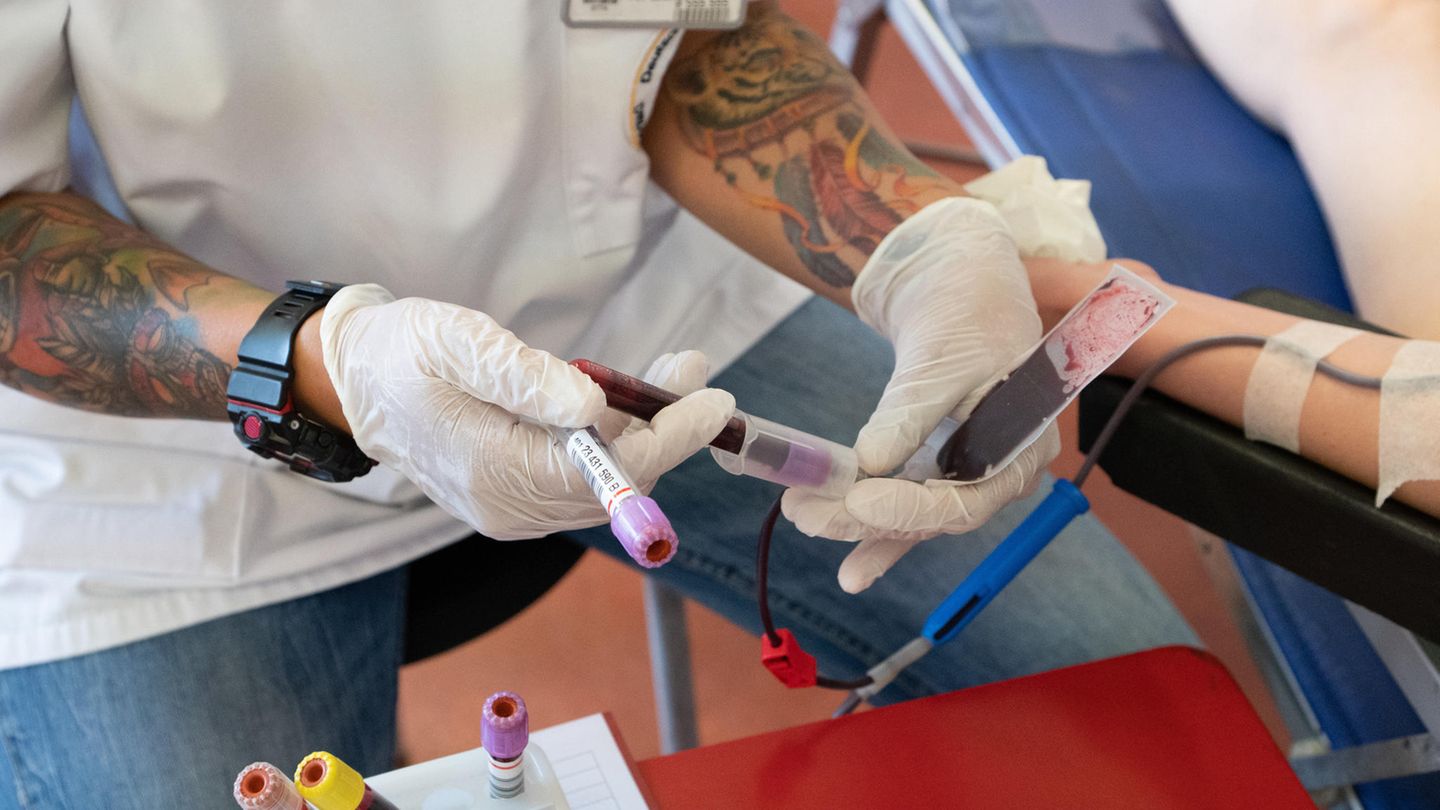Summer is usually a dry spell for blood donation services. On World Blood Donor Day, they warn that this vital commodity could become scarce again – also because of the European Football Championship. Questions and answers about blood donations.
Blood is precious and scarce as a donation: around 15,000 blood donations are needed every day in Germany for operations, accident victims and the treatment of serious illnesses such as cancer. With summer approaching, a classic dry spell for donation services is now approaching. For this reason, donations are being called for again on World Blood Donor Day this Friday.
Who can donate blood?
In principle, anyone over the age of 18 who weighs at least 50 kilograms can donate blood. The previous upper age limit has been abolished. The decisive factor is the state of health. This is checked before each donation. The blood itself is also tested for hepatitis A, B, C and E as well as HIV, syphilis and rubella viruses to prevent pathogens from being transmitted unnoticed.
How often can you donate blood?
Women can donate blood four times and men six times within a year. The period between two blood donations must be at least eight weeks. The body renews blood cells within two weeks, but it takes around two months to compensate for the loss of iron, and a little longer for women.
When you donate blood, 500 milliliters are taken – this can help up to three seriously ill or injured people. However, blood preparations only last for a maximum of 42 days, and some concentrates only last for a few days.
Are blood donations enough?
According to the German Red Cross (DRK), only around three percent of the population donates blood regularly. This is far too few to ensure a sufficient supply of blood products in the long term. Seasonal reasons that prevent people from donating are a recurring problem. According to the DRK, the recent holidays and long weekends have already led to a decline in the willingness to donate, and a further decline is currently expected due to the European Football Championship, the Olympic Games and the summer holidays.
Who donates the most?
Baby boomers are still the main source of blood donations. Demographic change, and in particular the aging of baby boomers, is currently the biggest concern for experts. Not only are many donors no longer available for health reasons, but many former donors are now also becoming blood donation recipients because the risk of being dependent on a blood donation increases with age.
Who is excluded from donating blood?
Women should temporarily refrain from donating blood during pregnancy and after giving birth. A temporary exclusion also applies after many vaccinations and trips abroad to malaria areas or countries with a risk of hepatitis. Donations are temporarily not possible after major operations or when taking certain medications. Corona disease is also a – temporary – reason for exclusion.
After acupuncture treatments, unless they were demonstrably carried out under sterile conditions, as well as piercings and tattoos, you should wait at least four months before donating again to ensure that infections are ruled out.
“Why aren’t we talking about this?!”
A book that answers life’s big questions – and illustrates social taboos
Does sexual behavior play a role?
The exclusion of homosexual men from donating blood has been abolished. However, regardless of sexual orientation, all people who have exhibited sexual behavior within the past four months that carries a significantly increased risk of transmission of serious infectious diseases transmitted through blood are excluded from donating blood for four months.
This includes sexual intercourse with more than two people, sex with a new partner or if anal sex has been practiced. It also includes sex work and the use of sex work, as well as sexual intercourse with partners who are infected with hepatitis B or C or with HIV.
Is there also a permanent exclusion?
This applies, for example, to certain pre-existing conditions such as insulin-dependent diabetes, hepatitis or chronic inflammatory diseases. Blood clotting disorders and malaria can also lead to this. Those interested in donating blood should contact the blood donation service to find out whether they are allowed to donate.
Source: Stern
I’m Caroline, a journalist and author for 24 Hours Worlds. I specialize in health-related news and stories, bringing real-world impact to readers across the globe. With my experience in journalism and writing in both print and online formats, I strive to provide reliable information that resonates with audiences from all walks of life.




